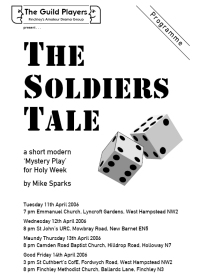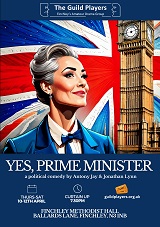The Soldiers Tale

a short modern mystery play for Holy Week by Mike Sparks
April 2006
- Tuesday 11th at 7pm
Emmanuel Church, Lyncroft Gardens, West Hampstead NW6 (map) - Wednesday 12th at 8pm
St John's URC, Mowbray Road, New Barnet EN5 (map) - Maundy Thursday 13th at 8pm
Camden Road Baptist Church, Hilldrop Road, Holloway N7 (map) - Good Friday 14th at 3pm
St Cuthbert's CofE, Fordwych Road, West Hampstead NW2 (map) - Good Friday 14th at 8pm
Finchley Methodist Church, Ballards Lane, Finchley N3
The full programme [52K pdf] for this production is available from the archive
For script details visit the H & S Productions website
Setting
A barrack room in the Roman garrison of Jerusalem
| Cast | |
| Cleaner | Paola Burgess |
| Soldier 1 | Nick Drewry |
| Soldier 2 | Paul Sparks |
| Temple Police Officer | Catherine Walker |
| Woman | Penelope Nachir |
| Centurion | Stephen Sewell |
| Production Team | |
| Director | David Constable |
| Technical | Martin Higgins |
| Andy Higgins | |
| Costume | Jenny Sparks |
| Script | Mike Sparks |
Programme Notes
Mystery plays date back to medieval times, when groups of local people would perform sets of popular religious plays, telling key bible stories from creation, Jesus' life and death, to the last judgement.
From about the eleventh century, plays on biblical subjects were acted out in church by the clergy. These plays became very popular, and eventually moved out of the church into streets and marketplaces, to be performed in English, by lay people, on religious holidays.
The performers who took over from the clergymen were mostly members of craftsmens' guilds which were commonly known as 'mysteries', from the Latin 'mysterium', meaning 'handicraft' or 'office'. Thus, the plays they performed came to be known as 'mystery plays'.
The plays evolved to include topical social themes and comic scenes and jokes, with wildly extravagant costumes and special effects, although the emphasis remained on the message of God's relationship with man and on the promise of salvation through Christ.
The mystery plays would often be performed around the feast of Corpus Christi, which normally falls in mid-June, in an atmosphere of great festivity. The guilds performed on decorated carts called 'pageants', with each play being performed by a particular guild, on a separate cart. On the day of the festival the pageants travelled in procession through the town. Each pageant stopped at each street to perform its play, and then moved on, to be replaced by the next pageant, performing the next episode in the sacred drama. Although each play was fairly short, the complete cycle of plays took a very long time, sometimes more than three days!
A separate subgroup of plays telling the Easter Passion stories developed, and were often performed in Holy Week.
Alongside mystery plays, there is a tradition of country drama 'mummers' plays. These folk dramas also involve travelling bands of local performers, and the stories, although at first glance appearing to be more secular, share the themes of resurrection and the triumph of good over evil with the passion and mystery plays.
Mike Sparks' modern language piece draws on these traditions - a folk drama of the Easter story, acted by local people, travelling to different venues, and combining performance, celebration and worship.
Here in Holy Week we deal with one of the major planks of the Christian religion. The mystery play format enables us to look at what went on around the main events and how the ordinary people who had been involved, perhaps only on the fringes, might have viewed what was happening. How did it affect them, their lives, and the lives of those around them? Can we add to the understanding of events by looking at them through different people's eyes? "The Soldiers Tale" follows last year's production, "An Inn Keeper's Tale" , in trying to do this in a straightforward and accessible way, without losing the impact of the story.



